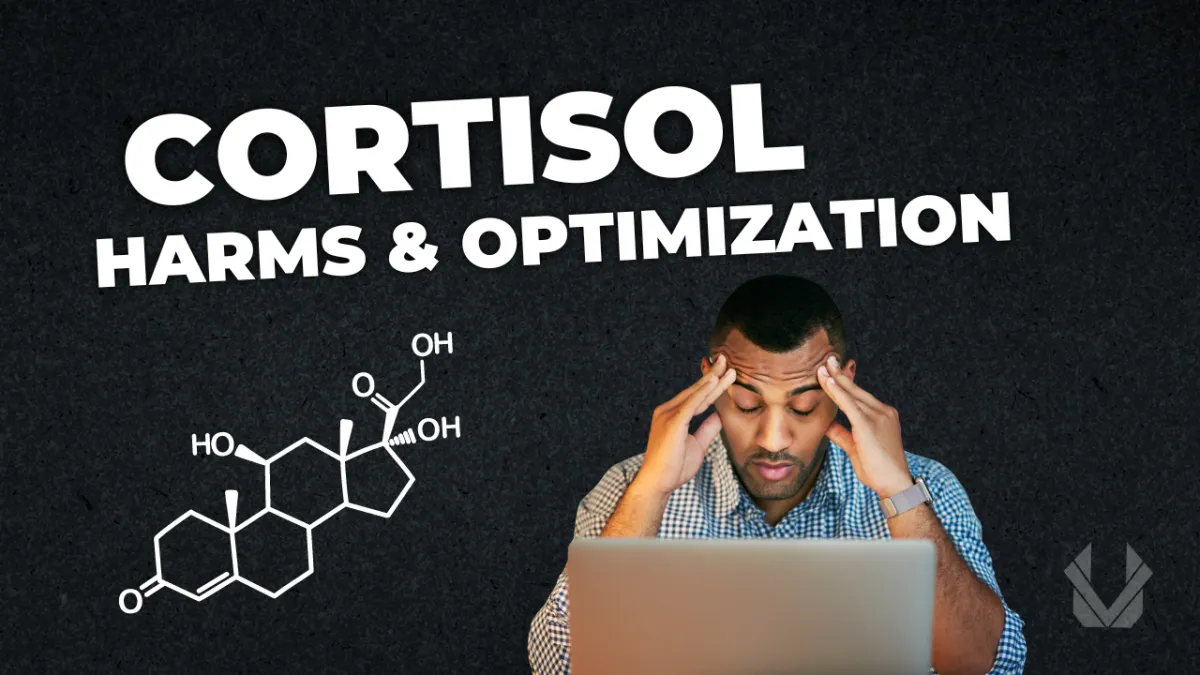THE UNYIELDING VIGOR BLOG
Our goal is to give you the most scientifically accurate and POWERFUL biological enhancement resources in the world
We're here to set new standards for truth, accuracy and effectiveness in the health industry. You'll find more value and scientific proof in our free articles than in most content you pay for.

Excess Cortisol: The Silent Health Threat of Chronic Stress
Excess Cortisol: The silent health threat
In today's fast-paced world, stress has become an inevitable part of daily life for many. But what exactly is the toll chronic stress takes on our overall health? Delving deeper into this question reveals a silent health threat lurking beneath the surface: excess cortisol.
Unveiling the Silent Health Threat
If you've ever felt overwhelmed by stress, you're not alone. I, too, found myself caught in the grips of relentless stress not too long ago. The pressures of losing my electronic engineering business amidst the disruptions of COVID-19 left me grappling with constant anxiety. As the mainstream media bombarded me with a barrage of bad news, I turned to unhealthy coping mechanisms, including alcohol and weed, in a futile attempt to find solace.
The result? My testosterone levels plummeted to the bottom of the range, leaving me feeling depleted and defeated.
But as my subscribers know, my journey didn't end there. Through a combination of lifestyle changes, supplements, and resilience-building strategies, I managed to reclaim my health and vitality, leading me to believe that every setback is a setup for a greater comeback. I not only bounced back but emerged stronger and more resilient than ever before.
But I wanted to really dive in to the impact that chronic stress has on our body, as the better we understand the consequences, the more we realize the importance in helping reduce our stress levels. So today I am sharing this blog post "Understanding the Impact of Chronic Stress on Your Health" in which I cover areas of research that have been suppressed in western journals, but with my backdoor access to information, I was able to uncover in hopes that it can benefit you.
Evolution of Stress Theory
In the mid-19th century, Hans Selye introduced the "General Adaptation Syndrome" (GAS) theory, revolutionizing our understanding of stress ¹. He identified three stages – alarm, resistance, and exhaustion – that our bodies go through when exposed to stress.
Selye's experiments with rats revealed that different stressors all produced the same outcomes: adrenal hyperactivity, lymphatic atrophy, and peptic ulcers. This led him to the profound realization that stress is a universal response within the body. This concept expanded our comprehension of stress from a vague notion to a well-defined field of study. Selye's legacy endures, as he laid the foundation for the modern understanding of stress and its impact on health and well-being.
Main Organ Systems Affected by Chronic Stress
Chronic stress and elevated cortisol levels can have profound implications on the normal functioning of vital organ systems, leading to widespread negative consequences. This intricate interplay between chronic stress and the body's organs can result in a range of health issues. Let's delve into the specific organ systems affected, beginning with an exploration of the impact on the immune system.
lymphatic system and Immune Function
High levels of glucocorticoids have been demonstrated to trigger apoptosis in pre-B cells emerging from the bone marrow, subsequently depleting the pool of mature CD19+ B lymphocytes available to produce antibodies. This compromises the effectiveness of the immune response, ultimately leading to lymphatic atrophy, which, in turn, suppresses the immune system's capabilities and limits the body's ability to combat infections ².
Notably, while short-term cortisol spikes can suppress certain aspects of the immune system, chronic elevation can also promote inflammation. Cortisol can stimulate the excessive production of pro-inflammatory cytokines interleukin-6 (IL-6) ³ and tumor necrosis factor-alpha (TNF-α) ⁴.
Thymus and Immune Function
First a quick explanation as to the types of T cells. Double-positive T cells are like trainees in the immune system. They are still learning and haven't specialized yet. They go through a process where they need to recognize and learn about the body's own substances to avoid attacking them. Most of them don't make it through this learning phase and die, but the ones that do become specialized single-positive T cells, ready to fight off infections. Naive T cells are simply ones that have not yet encountered an antigen, like a germ or pathogen.
The thymus gland plays a pivotal role in the immune system's ability to combat pathogens, tumors, and other threats to tissue integrity. Chronic stress can lead to acute thymic atrophy ⁵ ⁶, characterized by a reduction in double-positive (DP) thymocytes and reduced output of naïve T cells to the periphery ⁷. Naive T cells are essential to continuously respond to unfamiliar pathogens that the immune system has not yet encountered ⁹. When a naive T cell recognizes an antigen, it results in the initiation of an immune response. Therefore, when the naive T cell output is reduced to the periphery, it could weaken the body’s ability to fight off new infections.
Double-positive thymocytes represent a crucial stage in T cell development, as they move into the thymic cortex tissue where they are presented with self-antigens ⁸. Most of these cells undergo apoptosis after failing positive selection, with only the surviving cells maturing into single-positive T cells. A reduction in DP thymocytes can result in decreased production of mature T cells, weakening the immune response ⁸.
Reproductive system- Testosterone and Estrogen
Elevated stress levels and cortisol disruption can interfere with testosterone production by downregulating Atp5a1, a protein associated with mitochondrial energy metabolism in Leydig cells. Reduced Atp5a1 expression leads to mitochondrial dysfunction, affecting testosterone production ¹⁰. This disruption interferes with the conversion of cholesterol to pregnenolone, primarily by inhibiting STAR, a critical precursor of all steroid hormones.
Cortisol, in relation to the adrenal glands, directly inhibits the activity of 17α-OH ¹¹, an enzyme responsible for converting pregnenolone to 17-hydroxypregnenolone, a precursor to DHEA and other adrenal androgens. This blockade reduces DHEA production.
Furthermore, cortisol can increase the expression of aromatase ¹², resulting in the conversion of more testosterone into estrogen. Elevated estrogen levels lead to further reduction in testosterone production due to negative feedback signaling, decreasing the testosterone-to-estrogen ratio.
Chronic Stress Effects on the Brain
Chronic stress can lead to hippocampal shrinkage, impairing memory and cognitive function ¹³. Moreover chronic stress in rodents has been shown to cause epigenetic changes as noted by changes in DNA methylation patterns. DNA methylation changes in the brain due to chronic stress can increase the risk of mood disorders like depression. Epigenetic changes from stress may be transgenerational, impacting offspring ¹⁴ ¹⁵.
Pineal Gland
The pineal gland, responsible for producing melatonin and acting as a potent antioxidant, is adversely affected by chronic stress. It has been observed that chronic stress reduces the expression of three critical sympathetic markers in the pineal gland: tyrosine hydroxylase, p75 neurotrophic factor, and α-tubulin ¹⁶. These markers are crucial for the normal functioning of the pineal gland. Tyrosine hydroxylase (TH) plays a role in pineal gland innervation, which involves the supply of nerves to this specific area. TH is crucial for the proper functioning of the nerve fibers connecting the superior cervical ganglia and the pineal gland, which regulate melatonin production ¹⁷ ¹⁸. Sleep deprivation can also cause a downregulation of the brain's Dopamine D2 receptor ¹⁹ in the striatum. As illustrated in the chart below, melatonin production is inversely associated with the morbidity rate.

The Interconnected Dilemma: Pineal Gland and Thymus
Despite their seemingly unrelated functions, the pineal gland and thymus share a significant interconnection that exacerbates the negative effects of chronic stress ²⁰. When one is compromised, it amplifies the decline of the other, resulting in a compounding effect that undermines sleep regulation, immune response, and overall well-being. Recognizing the interdependence of these two vital organs emphasizes the importance of stress management to break this cycle and preserve overall health harmony.
Bone & Cartilage Health
High cortisol stimulates the activity of osteoclasts, cells responsible for breaking down bone tissue. This heightened osteoclast activity accelerates bone resorption, further contributing to decreased bone density ²¹ ²². Simultaneously, cortisol also decreases osteogenesis, decreasing bone formation and growth even more ²³ ²⁴.
Furthermore, cortisol decreases calcium absorption, which isn’t great since calcium plays an important role in bone health ²⁵.
It also seems that glucocorticoids may be activating ERRγ ²⁶. This may promote the degeneration of cartilage through the action of the inflammatory MMP pathways ²⁷. This may explain why most treatments for joint disorders are so destructive since professionals use glucocorticoids to reduce the pain.

Vascular Health
Prolonged stress initiates an intricate cascade of events affecting vascular health. Notably, it triggers the release of proinflammatory cytokines, such as IL-1 and IL-6, TNF-α, and IFN-γ. These cytokines fuel a chronic inflammatory state, contributing to vascular damage and expediting the development of cardiovascular diseases. Stress also perturbs endothelial function by inhibiting the production of nitric oxide and increasing the secretion of endothelin-1 which results in vasoconstriction. These changes contribute to endothelial dysfunction and increase risk of atherosclerosis. Furthermore, stress influences hemodynamics, causing alterations in heart rate, blood pressure, and vascular resistance ²⁸ ²⁹.
Conclusion
In our complex body systems, chronic stress and excess cortisol can create havoc, affecting various aspects of our health. These effects are significant and impact vital organs, the immune system, hormone balance, and even the health of our bones and cartilage.
Understanding the full extent of these negative consequences highlights the importance of making stress management a central part of our well-being. It's essential to realize that chronic stress affects not just our mental state but also our physical health. This knowledge empowers us to take action. If you are battling with chronic stress, our dopamine maximization course and testosterone maximization course are both excellent places to start. However, I would recommend the dopamine course first.
Unleash Your Vigor and Conquer Your Limits,
-Brenden Henry
GET OUR NEW, FREE TESTOSTERONE SUPPLEMENT GUIDE FOR 2024
Toxic Testosterone: The Hidden Health Risks of the 6 Most Common Testosterone Supplements
(Created and proven with the results of 107 scientific studies)

Unleash Your Vigor & Conquer Your Limits!
-Unyielding Vigor

